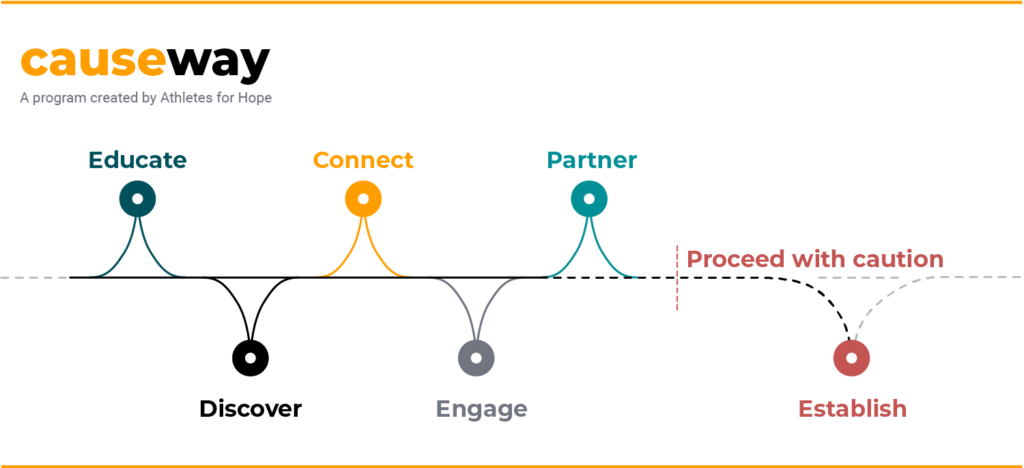The Map That Helps Athletes Give Back
By Chris Wyttenbach, AFH Chief Program Officer
Often, athletes want to make a positive difference in the world, but they don’t always know how to begin or how to turn their charitable passions into action. That is where the Causeway comes in.
The Causeway can seem like a complicated topic, especially for athletes who are new in their sports philanthropy journey. However, you will come to find out that it isn’t a race to the finish line, but rather a lifelong road map that leads to education, discovery, connection, and partnership.

Getting Into The Roadmap
What is the Causeway?
Athletes should approach charitable involvement in the same way that they approach their sports, and that’s what the Causeway does. It’s a series of steps that focus on education, reflection, improvement, and, ultimately, impact. It provides a structure that prevents athletes from getting ahead of themselves and gives them the opportunity to truly understand their platforms as agents of change for the causes that they care about.
The Causeway is a road map specifically designed to help athletes map out their charitable involvement.
When was the Causeway created?
The Causeway came together a few years after the creation of Athletes for Hope. Taking from the leadership of our Founding Athletes and the feedback from all of our AFH Athletes, we recognized that there was an opportunity to formalize the charitable journey for athletes. So, working with one of our pro bono partners, we took a deep dive into the many elements that are within sports philanthropy. The end product was the Causeway, which is now at the root of all that we do. We didn’t just stop with the creation of the Causeway concept, though. We went on to incorporate the important takeaways from the Causeway into a series of workshops that make it easier for athletes to understand and apply to their own charitable involvement.
Why is the Causeway Important?
The Causeway is full of important tips that athletes can easily incorporate into their charitable involvement. All of these tips equal an approach that leads to smart philanthropy for athletes. For example, as with anything, skipping key steps in a process can set you back. This doesn’t happen all the time, but it happens more than you would think regarding athlete charitable involvement. The Causeway’s structure prevents you from moving too fast. As we say to our athletes, it’s not a race. More broadly speaking, the Causeway leads to a greater level of efficiency, which is so important when it comes to social impact.
The Causeway leverages the good work that non-profits are already doing and allows athletes to easily combine efforts, learn about the issue, and make an impact.
What are the different destinations in the Causeway?
The Causeway has six steps, or destinations, starting with “Educate.” Education is at the beginning of every charitable athlete’s philanthropic journey. Our workshop series helps athletes start thinking about the concept of giving back from an athlete’s perspective and helps them map out their course.
The next step is “Discovery.” Here the athlete takes a moment of self-reflection to identify their passions and motivations. The athlete is now ready for “Connection.” At the Connection step, athletes begin to get into the community and determine what organizations align with their interests and availabilities. Assuming the athlete finds the right organization, they can move on to the next step which is “Engage” where the athlete starts to dedicate more time and resources to this one organization.
Then, if the athlete and organization are ready, the athlete moves to “Partner.” Athletes at this step are leaders in the space and publicly stand with the cause in the public eye. The athlete is a part of the team for their partner non-profit and consistently leverages their platform on behalf of their partner. The last step on the Causeway isn’t for everyone. “Establish” is if an athlete is ready to create a foundation, donor-advised fund, etc. An athlete should go through a series of exercises to determine if this is the right course of action.
It’s important to remember that charitable involvement is not a race and an athlete can stop at any point along the way.
The Causeway works well and its structure recognizes that each athlete’s philanthropic journey is as different as the athlete themselves.
What are some misconceptions surrounding sports philanthropy?
The Causeway addresses some of the major misconceptions around sports philanthropy. For example, you don’t need to be a superstar to make a difference in your community. There are thousands of examples of AFH Athletes making an impact with their causes in their local communities and nationally.
The athlete platform is not something that only household-name athletes have, rather it’s something that all athletes have.
That’s the power of sports. And, put simply, athlete foundations aren’t necessarily the gold standard for athlete social impact. For some athletes, foundations make sense. But, there are many other ways to make an impact. The Causeway helps find the right path for you.
If you are an athlete looking to begin your journey into sports philanthropy, contact us here.
